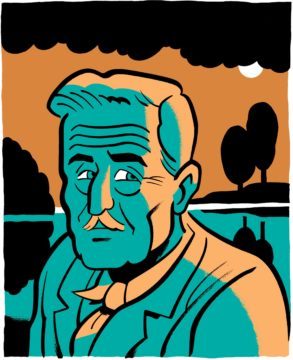Casey Cep in The New Yorker:
 What if the North had won the Civil War? That technically factual counterfactual animated almost all of William Faulkner’s writing. The Mississippi novelist was born thirty-two years after Robert E. Lee surrendered to Ulysses S. Grant at Appomattox, but he came of age believing in the superiority of the Confederacy: the South might have lost, but the North did not deserve to win. This Lost Cause revisionism appeared everywhere, from the textbooks that Faulkner was assigned growing up to editorials in local newspapers, praising the paternalism and the prosperity of the slavery economy, jury-rigging an alternative justification for secession, canonizing as saints and martyrs those who fought for the C.S.A., and proclaiming the virtues of antebellum society. In contrast with those delusions, Faulkner’s fiction revealed the truth: the Confederacy was both a military and a moral failure.
What if the North had won the Civil War? That technically factual counterfactual animated almost all of William Faulkner’s writing. The Mississippi novelist was born thirty-two years after Robert E. Lee surrendered to Ulysses S. Grant at Appomattox, but he came of age believing in the superiority of the Confederacy: the South might have lost, but the North did not deserve to win. This Lost Cause revisionism appeared everywhere, from the textbooks that Faulkner was assigned growing up to editorials in local newspapers, praising the paternalism and the prosperity of the slavery economy, jury-rigging an alternative justification for secession, canonizing as saints and martyrs those who fought for the C.S.A., and proclaiming the virtues of antebellum society. In contrast with those delusions, Faulkner’s fiction revealed the truth: the Confederacy was both a military and a moral failure.
The Civil War features in some dozen of Faulkner’s novels. It is most prominent in those set in Yoknapatawpha County, an imaginary Mississippi landscape filled with battlefields and graveyards, veterans and widows, slaves and former slaves, draft dodgers and ghosts. In “Light in August,” the Reverend Gail Hightower is haunted by his Confederate grandfather; in “Intruder in the Dust,” the lawyer Gavin Stevens insists that all the region’s teen-age boys are obsessed with the hours before Pickett’s Charge at Gettysburg. In these books, no Southerner is spared the torturous influence of the war, whether he flees the region, as Quentin Compson does, in “The Sound and the Fury,” or whether, like Rosa Coldfield, in “Absalom, Absalom!,” she stays.
A new book by Michael Gorra, “The Saddest Words: William Faulkner’s Civil War” (Liveright), traces Faulkner’s literary depictions of the military conflict in the nineteenth century and his personal engagement with the racial conflict of the twentieth. The latter struggle, within the novelist himself, is the real war of Gorra’s subtitle. In “The Saddest Words,” Faulkner emerges as a character as tragic as any he invented: a writer who brilliantly portrayed the way that the South’s refusal to accept its defeat led to cultural decay, but a Southerner whose private letters and public statements were riddled with the very racism that his books so pointedly damned.
More here.
